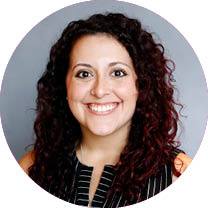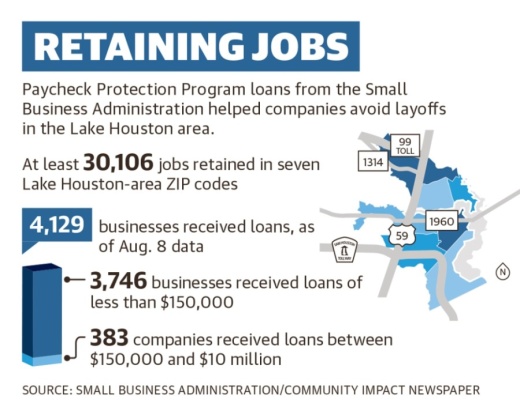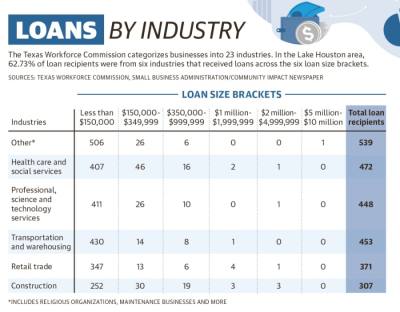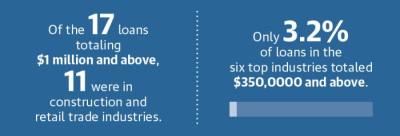The U.S. Small Business Administration’s Paycheck Protection Program provided relief to businesses, companies, nonprofits and churches across the state, including thousands across seven Lake Houston-area ZIP codes—77044, 77338, 77339, 77345, 77346, 77365 and 77396.
SBA data from Aug. 8 shows 3,746 area companies received loans of less than $150,000, while 383 received loans ranging from $150,000 to $10 million. The loans helped retain 30,106 jobs.
Frank Barbella, the owner of Kenneth’s Complete Car Care Center in Kingwood, said in a mid-August interview that his shop received $478,000 in PPP funds and retained all 26 employees.
“[We’re] still quite concerned now that we’re out of the money,” he said. “But if that loan is able to go away completely, we’ll be able to weather the storm.”
Local entities are also trying to help businesses. The Lake Houston Area Chamber of Commerce and Lake Houston Area Economic Development Partnership sent out a survey from Texas A&M University-Corpus Christi on Aug. 27 to business owners and managers.
LHEDP President Mark Mitchell said the results from 60-100 local businesses showed 74% of them have fully reopened, while 26% are still on reduced hours. Overall, businesses saw an average of 27% revenue loss during the pandemic.
Mitchell said the results will help the LHEDP and chamber develop future programs to help build resiliency, much like the entities did after Hurricane Harvey.
“The next step for us is to take this data and start using that same Harvey model and building that same resiliency infrastructure from there,” he said.
Federal funding
The Coronavirus Aid, Relief and Economic Security Act became law March 27 and provided employers with nearly $350 billion in PPP loans, per the SBA. In May, elected officials approved $320 billion more for the program.
Including Kids Autism Center is an Atascocita nonprofit that received between $350,000 and $1 million in PPP funding and was able to retain 67 employees, according to SBA data.
Executive Director Jennifer Dantzler said the loan allowed the autism support group to avoid layoffs. Including Kids offers therapy and support for children and young adults with autism, and Dantzler said seeing familiar faces is important for clients.
“Our children [and] young adults saw those familiar faces, and then there wasn’t a learning curve to get new staff trained,” she said.
However, when PPP applications closed Aug. 8, almost $133.99 billion remained unused nationwide. Valerie Maher, the lead economic development specialist for the SBA Houston District Office, said she believes some companies were not aware of the program or were skeptical about the loan forgiveness aspect.
Many who did receive the loan, however, may still need additional funding, she said.
“There’s many businesses that took advantage of the PPP loan, and it wasn’t enough,” she said. “These PPP loans were covering payroll for about two and a half months, and obviously this pandemic is lasting longer.”
However, Maher said Congress could extend the program through 2020—using the remaining coronavirus relief funding—and reopen it to businesses that already received a loan. As of press time, Congress has not approved a new relief bill.
Local assistance
The city of Houston and Harris County have also tried to provide businesses relief through federal funding.
The city of Houston closed its $15 million Small Business Economic Relief Program on Sept. 4, which gave grants to small businesses and chambers of commerce. Days after, the city added $5 million more to the program to meet the demands of 8,595 applicants.
Marsha E. Murray, the director of the business opportunity office at the city of Houston, said via email that the extra infusion of funds ensures more businesses can stay open. She said half of grant funds will be distributed after applicants have been approved, and all funds will be disbursed by the end of October.
“We knew the need was great, especially for small business that did not qualify for other federal or local programs or did not receive enough funds to mitigate the impact of the crisis,” she said.
As of press time, information on how many Kingwood businesses applied for the grant and qualified was not available.
Meanwhile, Harris County, the city of Houston and nonprofit BakerRipley also opened applications for their $60 million rent relief program in mid-August that assists tenants and landlords. The application period will remain open indefinitely.
Harris County Precinct 2 Commissioner Adrian Garcia, who led the effort to establish the fund, said he believes residents facing economic hardships caused by the pandemic should not have to worry about being evicted.
“The pandemic is not the fault of anyone who has depended on the local economy to make ends meet,” he said in a Sept. 1 interview.
Landlords must be registered for the program in order for tenants to apply. Once a tenant is approved, landlords are given payments directly from the relief fund on behalf of their approved tenants, Garcia said.
Debbie Bixby, who co-owns Green Oaks Tavern in Humble and owns the building, said she applied for Harris County’s program and encouraged tenants struggling to make rent to also apply.
Although Green Oaks Tavern received a PPP loan in April, funding ran dry in late July because the bar has been closed almost continually since March 17, she said.
Although bars can reopen as restaurants based on Texas Alcoholic Beverage Commission guidelines, traditional bars are not yet permitted to reopen since they are “nationally recognized as [COVID-19]-spreading locations,” Gov. Greg Abbott said on Sept. 14.
“We just need to be able to have the opportunity like everybody else to follow the guidelines and reopen the business,” Bixby said.
Shawn Arrajj and Andy Li contributed to this report.







